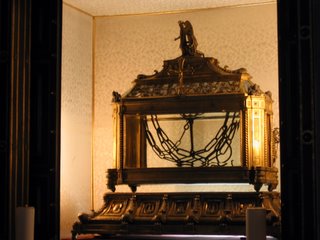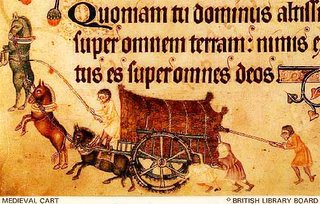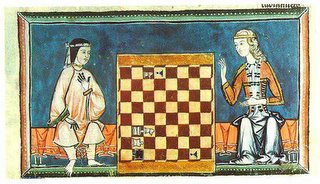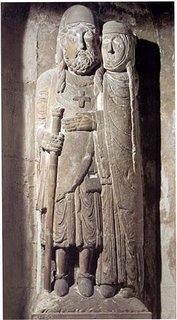 Dante by William Blake: the burden of the proud in Purgatory.
Dante by William Blake: the burden of the proud in Purgatory.We are preparing the child, filius imperatricis pulcherrimae Africae occidentalis, for his First Communion next May (he and his mother were both baptized last Easter -- he is ten years old). Part of this is his first Sacrament of Reconciliation which will take place, appropriately enough, next Saturday, the first weekend of lent. Preparing him forces me to think about how I relate to this sacrament, and I think I will confess myself next Saturday.
In my childhood, it was still a sacrament of guilt and darkened confessionals, sins reckoned up number by number, and a rushed series of Hail Marys as penance. My eight-year-old examination of conscience consisted of a panicked wondering about what sins I had committed. A quick survey of the Ten Commandments would give me enough ammunition to last through the frightening ordeal. Had I taken the Lord's name in vain? I must have said "God" inappropriately sometime. There's no way I could have always honored my father and mother. Bearing false witness meant lying, right? There's no way I had always told the truth. Armed with three broken commandments, I was ready to kneel down and whisper at the priest, sure that I must have sinned, though I may not have been aware of any particular occasion. I had enough material to get through the confession, mutter ten Hail Marys at breakneck speed, and get back into the sunlight and play, my soul shining with newfound cleanliness.
I think as a child I did appreciate the feeling of absolution, but I never really understood sin. The first time I went to confession as a believing adult was December 2004, and I haven't gone back since. That time I went to an understanding Jesuit and discussed all the difficulties that had arisen from my rejection of the Church as a teenager, and there really was plenty to talk about. Since then, it's been a bit more difficult. Oh, of course, there have been myriad failings on my part, but scanning the Decalogue doesn't seem to be that helpful to me. Counting individual trespasses does not aid to show me how and when I have fallen away from God -- which is, of course, what sin is about. Mortal sins--grave sins committed in the full knowledge that they are sins as a free, willful act--are actually easy to avoid committing in normal situations. Still, that is far from making us perfect and holy.
Reaching back into the tradition, I find the Seven Deadly Sins to speak to me about sin very clearly. Originally written about in a different form by the fourth-century ascetic and theologian Evagrius of Pontus, they came almost in their classic form to the West through the writings of Gregory the Great. Pride, greed, lust, sloth, wrath, gluttony, and envy: these are not individual crimes, rather they are habits of mind that cause us to think and act in ways that injure one another and take us away from God.
It is not surprising that it was first formulated by Evagrius at the dawn of Christian monasticism. Truly dedicated ascetics who mortified themselves in astounding ways on a quest for perfection are not likely to engage in egregious acts of sin, such as theft or adultery. They are more likely to fall prey to modes of thinking and feeling that are damaging in a different way: pride in their asceticism, sloth when they are tired of constantly singing psalms. The numbering up of individual acts of sin became more of a part of confession when the penitential lists of the evangelizing Irish monks were applied as a pastoral remedy to the problem of how to explain sin to an uneducated laity.
Now that we are no longer uneducated, we need more than simple lists of sin. I know that especially in the present political situation, I am not free from anger or from pride. Anger when I read the news, pride when I feel I somehow have a monopoly on the truth. Of course, sometimes we should be roused by injustice, as Christ was with the moneychangers in the temple. But when we let that anger take over, we lose sight of justice and seek vengeance or the misfortune of others. We feel free to despise. In a word, we fall into the destructive lie of sin.
The idea of the Seven Deadly Sins is useful because it identifies thought and intent, not just acts. Lust is a very good example. I think one of the greatest problems of the Church today is its focus on acts and not their meaning, especially in cases of sexuality. Sexuality becomes determined almost solely by biological imperatives (procreation) and not by intent and consequences. Thus a mistrust of homosexuality and an insistence on sexual asceticism that is difficult to achieve even by those who have sworn to celibacy, let alone by the laity (I'm thinking here about the classification of masturbation and birth control as sinful). It is true that sexuality is powerful, and one can sin by engaging in sexual activity. Sexual desire is not lust, sex is not lust. Lust is giving so into the force of sexuality that we become cruel and irresponsible--and I do believe more people give into lust than would admit it to themselves. I'm not ready to go into a full-scale critique of Paul VI's encyclical on birth control Humanae Vitae right here, but I think that a discussion of the sin of lust shows how we can avoid both an unhealthy kind of repressed fear of sexuality and a superficial and possibly dangerous concept of sexual freedom that does not take into account the power and consequences of sexuality.
Of course, there are people out there who have committed murder, theft, or adultery and need to confess those individual sins. They truly and deservedly feel a sense of guilt and the sacrament can be a great comfort to them. For most of us, it's a way for us to recognize those parts of us that are going towards God and those parts of us that are going away from God. It makes me happy to see that the Church that is preparing filius imperatricis pulcherrimae Africae occidentalis is a different one that prepared me. I'm sure it depends on where you are and what the priests are like. Please, find a priest who you trust and who knows it's your confession and your conscience. That makes for a good and meaningful Sacrament of Reconciliation, as well as true understanding of what sin is.




